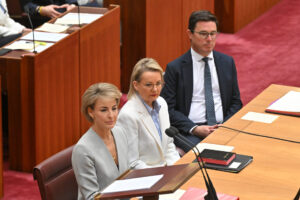Scott Morrison’s government loves financial incentives when they’re for CEOs and high-income earners

As any parent or child knows, sometimes threats work, and sometimes bribes work.
Despite the Morrison government planning to spend $180bn on tax cuts to those earning above $200,000 per year as more incentive to work hard, the Coalition are arguing that offering a $300 incentive to those who get their Covid vaccine before December is a “vote of no confidence” in Australians. So, do incentives work or don’t they?
The Morrison government loves incentives, sometimes. It offers some people free cash if they make voluntary contributions to their superannuation. Various governments offer incentives for first home buyers. And, when it comes to tackling climate change, for eight years the Coalition has told us that the “carrot” of spending more than $4bn on direct action is superior to the “stick”.
Then there’s the Coalition’s approach to other vaccines. In 2015, in response to low vaccination rates among kids, the “no jab, no pay” policy was introduced in which childcare benefit, the childcare rebate and a portion of family tax benefit part A are withheld from parents who refuse to vaccinate their children.
But when Anthony Albanese suggested a $300 payment to everyone vaccinated by December, the prime minister mocked the idea of “doing it for the cash”.
Let’s be clear, the Coalition has no doubt that incentives work for CEOs, high-income earners, those planning for retirement, those saving for their first home, and vaccination against non-Covid-19 illnesses. But for Covid-19, incentives aren’t the Australian way. Got it?
Incentives don’t always work, sometimes they’re counterproductive. There’s no strong evidence that huge CEO bonuses help anyone but the CEO, and when it comes to paying people to “donate” blood the evidence is mixed in terms of the impact of cash payments on both the quantity and quality of blood supplied.
Deciding when to offer incentives, when to impose taxes and when to rely on culture instead of cost to drive decision-making is no easy businesses. There is no “right” amount of tax to put on cigarettes, subsidies to offer to renewable energy or fines to place for speeding.
Take income tax, for example. Since its inception in 1915 the Australian income tax system has been “progressive”, which simply means that those with high incomes pay higher rates of tax than those with low incomes. But while there is little enthusiasm for a so-called “flat tax” system in Australia, there is no consensus about how much more tax someone who earns $1m a year should pay relative to someone who works full time for $40,000 a year. While the Coalition, and the Business Council of Australia, both argue that giving tax cuts to those earning $200,000 per year will give them an “incentive” to work harder and smarter, no empirical evidence has been put to support such a belief.
Likewise, while it’s possible that offering Australians $300 if they are vaccinated before December will have no discernible effect on vaccination uptake, there’s no actual evidence to support the strength of the prime minister’s feelings put forward. Judgment matters.
Many of those who are hesitant about vaccination don’t hold strong scientific or moral objections but are held back by factors as diverse as not liking needles to not fearing the virus. While a $300 payment is unlikely to convert the committed anti-vaxxers, $600 in the lead-up to Christmas is likely to motivate quite a few fence-sitting families.
A well designed tax and transfer system is based on clearly identified principles which should hold even when people don’t agree on how to implement those principles. From an economic point of view, it makes sense to tax things that we want to discourage (like carbon pollution), subsidise things we want to encourage (like vaccines and education) and collect taxes in ways that reduce inequality (like a progressive income tax system).
It’s true that cash incentives won’t be the silver bullet for Australia’s vaccine woes, especially when vaccines are in short supply. But it’s also true that income tax cuts won’t be the silver bullet to fix the slump in wages, productivity, and job security in Australia – that didn’t stop the Morrison government spending $180bn on them.
Incentives do matter in the design of our tax and spending system. There’s no doubt that if we redesigned Australia’s tax system to encourage the things we want more of and discourage the things we want less of, Australia could build a much more efficient and equitable economy. But, given that would require more taxes on pollution and wealth, it’s likely the government will make a nice big storm in Albanese’s $300 teacup instead.
Related research
Between the Lines Newsletter
The biggest stories and the best analysis from the team at the Australia Institute, delivered to your inbox every fortnight.
You might also like
Ley’s need to appease the far-right drags the Coalition into the political abyss
After months of reflection, recriminations and resolute commitments to change, we finally have the first concrete policy position for a government Sussan Ley would lead.
Second-term Albanese Government can escape the Liberal veto
While the exact numbers are not settled, what is clear is that the Albanese Labor Government has won a decisive majority in the Parliament.
The needle and the damage done
The federal government’s handling of the pandemic has been the worst public policy screw-up in Australian history


